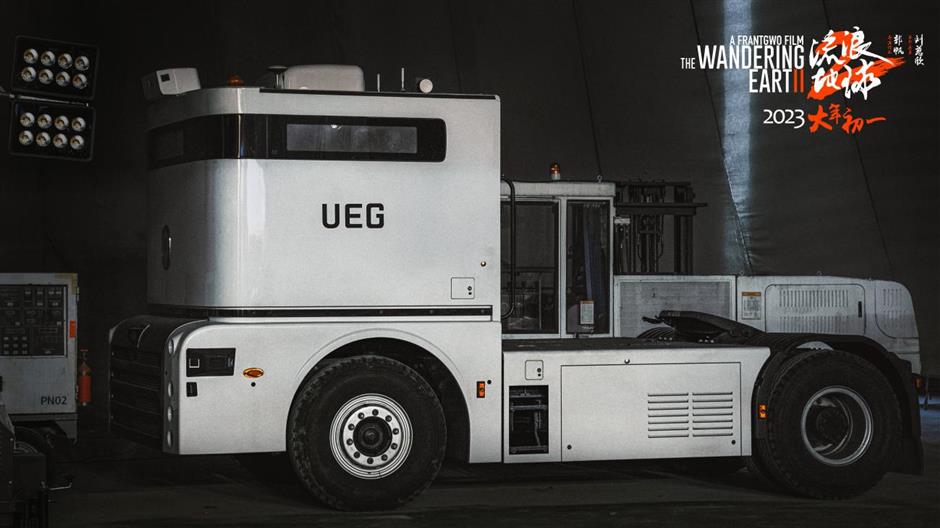Made-in-Shanghai tech featured in science fiction film becomes reality

Manless trucks and wearable robots are shown in the sci-fi blockbuster "The Wandering Earth II," one of the best-selling movies in Spring Festival.
Autonomous driving trucks, wearable robots, quantum computing and even nuclear fusion, have all made appearances in China's homemade sci-fi blockbuster "The Wandering Earth II." Now, each of these new technological advancements are set to become a reality.
Shanghai-based firms, including several startups, are involved in the innovation and products featured in the film, which represent China's most advanced industrial capability and research, presenting a landscape of future life.
"The Wandering Earth II" tells the story of mankind building enormous engines to propel Earth to a new solar system as the Sun is rapidly burning out, adopting various cutting-edge tech.
The film, a prequel to the 2019 sci-fi blockbuster "The Wandering Earth," pulled in about US$410 million, helping China's January box office total approximately 10 billion yuan (US$1.48 billion), a record high for the month.

The Q-Truck is able to transport products with precision, safety and order, even in harsh climates and complex road conditions.

This autonomous driving technology frees people from high-intensity, long-duration, high-risk driving operations, creating more efficient and sustainable productivity.
The Q-Truck is an autonomous truck which is a key transportation tool for the United Earth Government (UEG), a global organization like the United Nations in the film.
Both in the film and in reality, the Q-Truck is able to transport products with precision, safety and order around the clock, even in harsh climates and complex road conditions, according to Westwell, a Shanghai-based artificial intelligence firm that developed it.
Westwell is deeply involved in container logistics involving seaports, airports, railroad hubs and factories, offering design capabilities in autonomous driving.
This means that autonomous driving technology frees people from high-intensity, long-duration, high-risk driving operations, creating more efficient and sustainable productivity.
Now, the company's products and services are available in 16 countries and regions around the world, serving more than 120 customers worldwide.
Westwell products, including Q-Truck, have been shown and demoed in events like the World Artificial Intelligence Conference, or WAIC.
It fits well with Shanghai's strategy to develop three "pillar industries" for long-term development covering AI, chip development and biomedicine, according to the city's blueprint.

The exoskeleton suits people wear in the movie to help them move heavy things are not just imagination.
Robots also play important role in the film, which show their potential to help people in the future.
The exoskeleton suits people wear in the movie to help them move heavy objects are not just imagination. The suits, developed by Shanghai-based ULS Robotics, have already been put into real-life use.
The technology is now used in the automotive industry, airport ground service, high-end equipment manufacturing, logistics and other fields to help the human body reduce fatigue and occupational injuries. It enhances human strength and increases productivity.
In December, it received the certification for the European market to issue its possible overseas expansion, according to the company's website.

The suits, developed by Shanghai-based ULS Robotics, have already been put into real-life use.
Shanghai will speed up robot applications and innovation in automotive, medical and other industries, which will boost the scale of the robot-related industry to over 100 billion yuan by 2025. This will improve the city's digitalization and automation level to become a global innovation capital, city officials said in January.
The Ministry of Industry and Information Technology also released policies last month to support robot development nationwide.
Also in the film, quantum computers and nuclear fusion emerge as future technologies.
Shanghai-based miHoYo, a game studio and developer of Genshin Impact, has invested in a nuclear fusion company in China. Meanwhile, the game firm has invested in a Brain-Computer Interface or BCI, a key technology for digital life or immersing virtual world creation.
Shanghai has also set up strategies on forward-looking technologies such as metaverse, 6G and quantum communication, with national-level research organizations in the city.
Meanwhile, Chinese smartphone OnePlus 11 also appears in the film, which features super-fast charging and a high-definition screen.

A lady uses OnePlus 11 in the film.
















